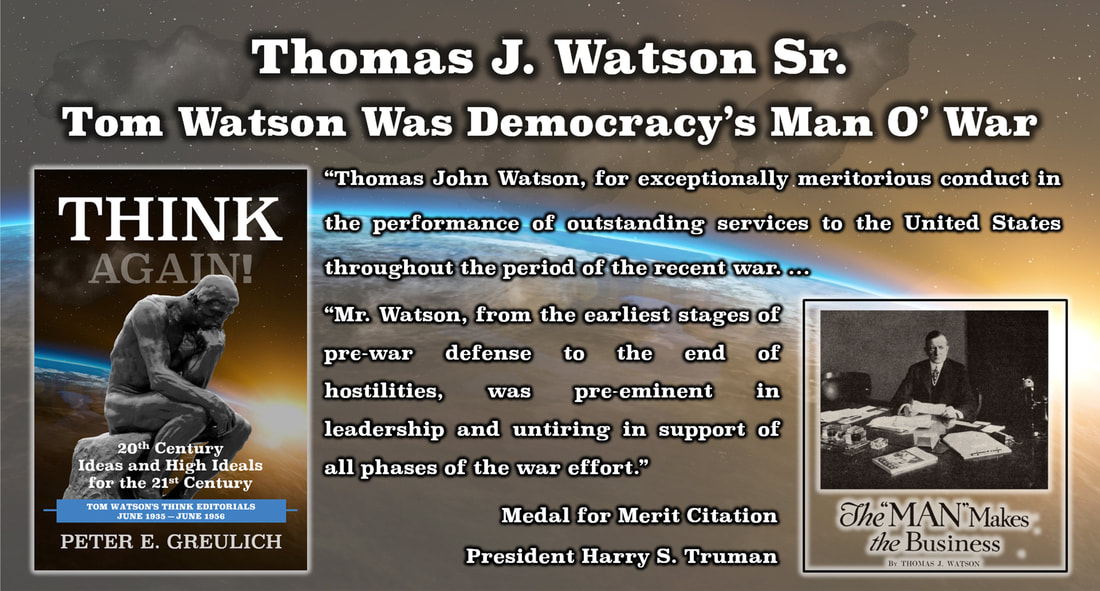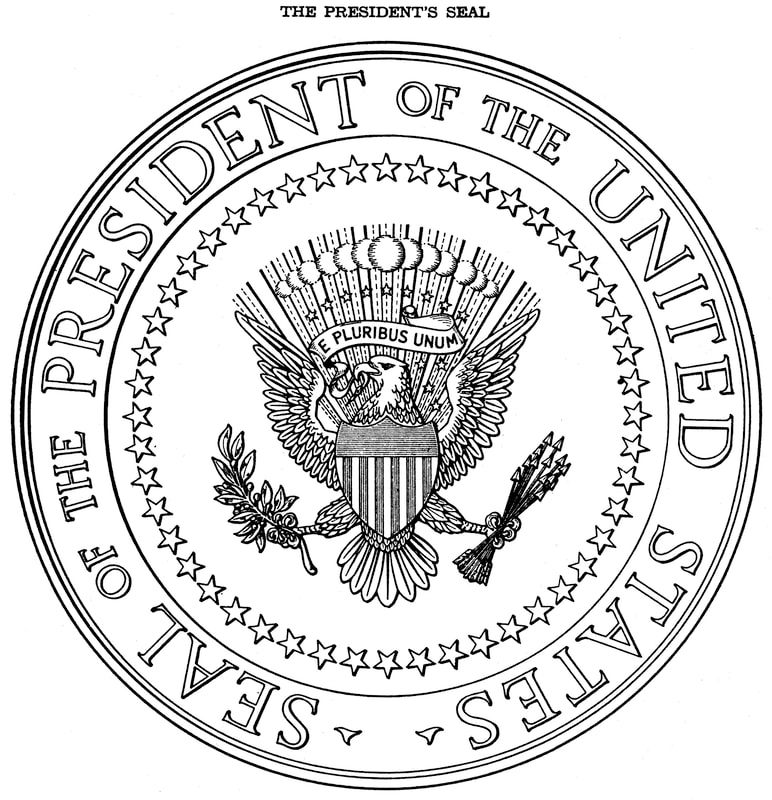Insights into Thomas J. Watson Sr., Traditional Founder of IBM from
"THINK Again!: 20th Century Ideas and High Ideals for the 21st Century"
"THINK Again!: 20th Century Ideas and High Ideals for the 21st Century"
Tom Watson: A “Man of Peace” Became “Democracy’s Man O’ War”
|
Presidential Recognition
|
As World War II came to a close, Tom Watson resumed his “fight” for world peace through the United Nations—mentioned in twelve of the twenty-four previous editorials.
This is an excellent place to stop within this collection to summarize how Tom Watson transitioned from seeking peace in the 1937–39 timeframe to supporting democracy’s war against fascism in the 1940–45 timeframe. Essentially, Tom Watson--A Man of Peace, became Democracy’s Man O’ War such that in the year that follows—1947, he was awarded the Medal for Merit—the highest civilian decoration that the President of the United States could grant at the time. |
For outstanding service to the nation during the war, Thomas J. Watson, IBM President, was awarded the Medal for Merit, conferred by President Harry S. Truman and presented by Secretary of War Robert P. Patterson in Washington, D. C., on May 19, 1947.
The Citation for Thomas J. Watson’s Medal for Merit
“Thomas John Watson, for exceptionally meritorious conduct in the performance of outstanding services to the United States throughout the period of the recent war.
“Mr. Watson, from the earliest stages of pre-war defense to the end of hostilities, was pre-eminent in leadership and untiring in support of all phases of the war effort. Anticipating the enormous administrative management problems, he converted his highly competitive selling organization to one of exclusive and intensive service to the Army, Navy, Air Forces and Government agencies which produced efficient and standardized record-keeping systems for all branches of the military and naval services. *
“When need arose, he personally directed the stripping of necessary equipment from the Accounting Department of his company’s own executive offices, and from its factory and sales offices all over the country, to meet the rush requirements for basic industrial materials. He made available to the Government the exclusive services of his highly trained technical personnel at great sacrifice to his own interests, and in all of his Government war contracts he voluntarily limited the profits to less than one and a half per cent and placed this sum in a fund for the benefit of widows and orphans of his employees who lost their lives in the war. **
“The avoidance of labor difficulties throughout his vast organization during this period was directly attributable to his sense of fairness and the policies and benefits he instituted for his employees. Mr. Watson’s organizing genius, technical knowledge in the production of munitions, his advice, assistance and encouragement of engineering and development of special war projects were contributions of inestimable value to the prosecution of the war.”
- - - - - - - - - - - -
* On February 2, 1940, Tom Watson announced IBM’s Department of Logistics to coordinate all its war activities. On September 14, 1940, the U.S. Congress passed the Selective Training and Service Bill; and by mid-October millions of young men were being registered for military service across the nation with tabulating machines. Within the State of New York, the 27th National Guard Division was called into service. Its commanding officer, General William N. Haskell, through his chief of staff, Colonel Tristram Tupper, asked Tom Watson to form a morale-building organization. He accepted the responsibility which eventually led to the formation of an organization called the USO-Camp Shows, which ultimately became synonymous with the name: Bob Hope.
** An audit after the war determined that the actual profit on munitions was less than 1 percent. Additionally, Tom Watson told employees in 1947 that “as part of the war program, the government [had initially] furnished the money to build the last new building at Endicott and the first building at Poughkeepsie. … [but] … We decided to give the government everything we had to help the war effort because there were just under 6,000 of our men and women in the service. … So, we paid the government all the money it had put in and did our own financing.”
“Mr. Watson, from the earliest stages of pre-war defense to the end of hostilities, was pre-eminent in leadership and untiring in support of all phases of the war effort. Anticipating the enormous administrative management problems, he converted his highly competitive selling organization to one of exclusive and intensive service to the Army, Navy, Air Forces and Government agencies which produced efficient and standardized record-keeping systems for all branches of the military and naval services. *
“When need arose, he personally directed the stripping of necessary equipment from the Accounting Department of his company’s own executive offices, and from its factory and sales offices all over the country, to meet the rush requirements for basic industrial materials. He made available to the Government the exclusive services of his highly trained technical personnel at great sacrifice to his own interests, and in all of his Government war contracts he voluntarily limited the profits to less than one and a half per cent and placed this sum in a fund for the benefit of widows and orphans of his employees who lost their lives in the war. **
“The avoidance of labor difficulties throughout his vast organization during this period was directly attributable to his sense of fairness and the policies and benefits he instituted for his employees. Mr. Watson’s organizing genius, technical knowledge in the production of munitions, his advice, assistance and encouragement of engineering and development of special war projects were contributions of inestimable value to the prosecution of the war.”
- - - - - - - - - - - -
* On February 2, 1940, Tom Watson announced IBM’s Department of Logistics to coordinate all its war activities. On September 14, 1940, the U.S. Congress passed the Selective Training and Service Bill; and by mid-October millions of young men were being registered for military service across the nation with tabulating machines. Within the State of New York, the 27th National Guard Division was called into service. Its commanding officer, General William N. Haskell, through his chief of staff, Colonel Tristram Tupper, asked Tom Watson to form a morale-building organization. He accepted the responsibility which eventually led to the formation of an organization called the USO-Camp Shows, which ultimately became synonymous with the name: Bob Hope.
** An audit after the war determined that the actual profit on munitions was less than 1 percent. Additionally, Tom Watson told employees in 1947 that “as part of the war program, the government [had initially] furnished the money to build the last new building at Endicott and the first building at Poughkeepsie. … [but] … We decided to give the government everything we had to help the war effort because there were just under 6,000 of our men and women in the service. … So, we paid the government all the money it had put in and did our own financing.”


